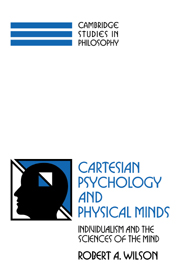Book contents
- Frontmatter
- Contents
- Preface
- 1 Introduction: What is individualism in psychology?
- PART I ON ARGUMENTS FOR INDIVIDUALISM
- PART II PSYCHOLOGICAL EXPLANATION AND MENTAL CAUSATION
- 5 Rethinking the role of causal powers in taxonomy and explanation
- 6 Making sense of mental causation
- 7 The place of folk psychology: computationalism, individualism, and narrow content
- PART III THE CASE AGAINST INDIVIDUALISM
- References
- Index
7 - The place of folk psychology: computationalism, individualism, and narrow content
Published online by Cambridge University Press: 05 June 2012
- Frontmatter
- Contents
- Preface
- 1 Introduction: What is individualism in psychology?
- PART I ON ARGUMENTS FOR INDIVIDUALISM
- PART II PSYCHOLOGICAL EXPLANATION AND MENTAL CAUSATION
- 5 Rethinking the role of causal powers in taxonomy and explanation
- 6 Making sense of mental causation
- 7 The place of folk psychology: computationalism, individualism, and narrow content
- PART III THE CASE AGAINST INDIVIDUALISM
- References
- Index
Summary
‘Folk psychology’ designates our commonsense knowledge about the mental causes of the behavior of agents who are rational in much the way that we ourselves are. We use this knowledge to predict and (especially) to explain the behavior of both ourselves and others by attributing beliefs and desires to such agents. Jane went to the refrigerator because she wanted a golden throat charmer and believed that the refrigerator was a conveniently close repository for such a drink. Peter doesn't drive when it snows because he thinks that under those conditions the roads are dangerous, and he wants to avoid harm both to himself and to others. In this chapter I focus on the place that folk psychology has in explaining human behavior, with three questions signifying the parameters of my discussion.
THREE QUESTIONS
First, how is folk psychology related to computationalism in psychology? Part of the motivation for discussing this first question comes from an interest in a more general question: What is the relationship between folk psychology and the cognitive sciences? The computational paradigm dominates much contemporary psychology and has served as an impetus for the cognitive sciences more generally. As a guide to the relationship between folk psychology and the cognitive sciences, I focus on the question about computationalism; such a focus has served as a surrogate for discussion of the more general question in much of the philosophical literature.
- Type
- Chapter
- Information
- Cartesian Psychology and Physical MindsIndividualism and the Science of the Mind, pp. 159 - 184Publisher: Cambridge University PressPrint publication year: 1995



